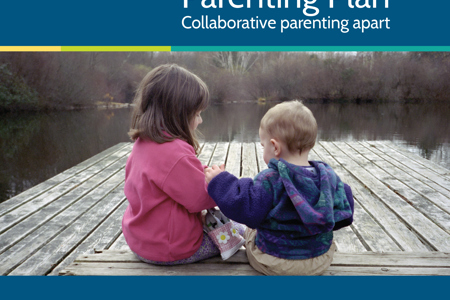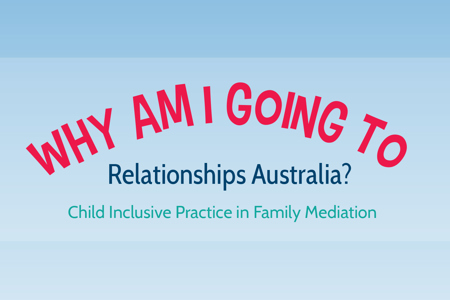
Family dispute resolution frequently asked questions
The questions below are designed to help you through the family dispute resolution (FDR) process at Relationships Australia Victoria (RAV). These are frequently asked questions (FAQs) that we receive. We hope it is helpful for you to understand the FDR process better as well as relevant information and referrals.
Our FDR Practitioners and administrators will refer back to these questions later in your FDR journey. This will assist them to provide an appropriate FDR service and also to provide you with relevant information and referrals.
Frequently asked questions
FDR stands for Family Dispute Resolution. This name was introduced in 2007 when the Family Law Act was amended.
FDR is different from other services and processes, such as counselling and court-based mediation.
FDR is often called mediation.
FDR uses step-by-step process to help people involved to negotiate and reach an agreement on the care of their children and/or financial or property settlements.
Family Dispute Resolution Practitioners (FDRPs) are the mediators who provide FDR.
FDRPs have specialised training and are registered as accredited practitioners with the Australian Government Attorney-General’s Department.
Our practitioners are very experienced and skilled in providing a safe, structured and professional process to facilitate communication and decision-making.
FDR can help separating or divorcing couples to resolve disputes and reach agreements about parenting and/or property matters.
Australian family law requires parents to attempt FDR before they can file an application for parenting orders. There are some exceptions to this requirement, however.
Reaching an agreement through FDR can give you a greater sense of agency and control, and lead to a more satisfactory agreement for everyone including your children.
When it is safe and appropriate, FDR is an affordable alternative to formal legal processes.
Research shows that FDR can improve communication, reduce conflict and strengthen co-parenting skills.
Call
- Contact the Family Relationship Centre.
- Answer a series of basic questions to help our staff understand your circumstances.
- Book an assessment appointment to meet with a practitioner.
Assessment appointment
- Meet separately (one-on-one) with an FDRP.
- Discuss the essential details about you, your children (if applicable), and your situation.
- The FDR process will be explained, and appropriate referrals and necessary information will be provided to you.
Focus on Kids session
- May be held before or after your assessment meeting, either in-person or online, depending on the centre and the current circumstances.
- Provides information on parenting after separation and an opportunity to reflect on the children's experiences when their parents minimise conflict and focus on their interests.
- Suggests how to prepare for mediation and how mediation fits in the family law system.
Second parent
- The steps so far are repeated for the other person/party.
- Suitability for FDR is determined by the FDRP after meeting both parties. The FDRP will discuss this with you.
- Confidentiality is maintained throughout the process.
Mediation
- FDR can occur in the same room, in separate rooms, or by telephone or by video.
- Your FDRP will ensure a safe, respectful, structured, professional process to support decision making.
- An agenda is agreed upon by both participants, ideas are proposed and discussed, and agreements can be made.
Once someone calls us and asks for FDR, they are offered an individual assessment appointment.
This assessment helps the FDRP to understand the person’s situation, determine if the service is appropriate for them and their circumstances, and work through the next steps for both parties (people in dispute) participating in FDR.
They’re also offered relevant information and referrals to a range of services, and are invited to attend an information session.
FDR can be used by all families, including:
- Families where the parents are separated.
- Extended families; Parents and grandparents.
- Aboriginal and Torres Strait Islander families.
- Families from LGBTIQA+ communities.
- Others with significant relationships with the children.
- Families from culturally and linguistically diverse backgrounds.
The safety of our clients, your families, and our staff, is our number one priority. We are committed to:
- safety for clients when attending our centres or using our services
remotely (e.g. telephone or video appointments) - a thorough assessment and an ongoing focus on the safety and
welfare of clients when participating in FDR - the safety and best interests of children. This is a primary
consideration in the FDR process.
If after an assessment, an FDRP determines that FDR may be a helpful process for a family’s current situation:
- an appointment is booked for both parties to attend FDR
- the parties may be present in the same room, or they may be in
separate rooms (a process called shuttle FDR). The FDRP decides
this.
During FDR:
- the FDRP will help to identify what is in dispute (an agenda)
- with the help of the FDRP, the parties will consider and discuss options that are in the best interests of the children. In property FDR parties go through a process to help achieve a property settlement
- after a period of negotiation, the FDRP may ask to talk to both parties separately to check in or explore ideas. Clients may also ask for this
- finally, the FDRP will assist parties to make a Parenting Plan or other agreement about their children. For property matters, a property agreement or other options may be explored. In some cases, the FDR process may take more than one appointment.
We take family violence very seriously:
- During the individual assessment that all clients attend, the FDRP screens for and explores any safety issues, and works through next steps.
- People who are impacted by family violence are provided relevant information and referrals.
- We know that FDR can still be helpful for some families impacted by family violence, and will only proceed where it is assessed as safe to do so.
Clients will NOT be forced into making an agreement.
One of the conditions of a Parenting Plan or any other parenting or property agreement is that it must be made voluntarily and without threat, duress and coercion.
The purpose of FDR is to provide a safe process where clients can explore issues, consider their options and choose whether or not to make decisions and agreements.
A Parenting Plan:
- is a list of agreements, made between parents, about spending time with and caring for children. Other people with an interest in children’s lives, such as grandparents, can also make written agreements in FDR
- is made voluntarily without threat, duress or coercion
- if signed, will be considered by the court should parents end up in court at a later stage, however a Parenting Plan is not legally binding.
The interests of children are represented by:
- FDRPs providing relevant information about, and referrals to meet, the needs of children.
- FDRPs keeping a focus on children throughout the FDR process. Parents are encouraged to make decisions in their children’s best interests.
The interests of children are also represented by:
- parents being encouraged to attend the ‘Focus on Kids’ session that focuses on the needs of the children. Participants attend via webinar and are not visible to other participants.
- using an optional process known as Child-Inclusive Practice, where the children are interviewed. This process is available when both parents agree and the FDRP thinks it is suitable.
You can prepare for FDR by:
- considering your priorities. For example, what are the crucial, relatively important and less important issues?
- thinking through both your best-case scenario, and what you would be willing to accept as an outcome
- coming to FDR with an open mind and willingness to explore options that don’t compromise safety.
FDRPs are required to assess whether FDR is suitable for each case, based on a range of different factors outlined in the FDRP Regulations (2008): https://www.legislation.gov.au/Details/F2008L03470
FDRPs make these decisions carefully, often in consultation with supervisors and/or managers.
If FDR is not appropriate, the FDRP will explore other options with clients such as negotiation through lawyers and legal processes.
We are only partly government funded so some fees are charged for FDR services.
We try to make our services as affordable as possible and will discuss this with you when you contact us to make an appointment.
For children aged 5 and under, we encourage you to:
- provide lots of reassurance to your children and not just when they look distressed
- be patient if your children have disrupted sleep and are
unsettled - consider that any changes to their routine need to be brought in slowly and sensitively
- avoid talking negatively about the other parent in front of your children.
For children aged 5 to 8:
- reassure them that they don’t have to choose between you and the other parent
- provide an opportunity for your children to talk about the anger and loneliness they may feel
- provide sensitive and age-appropriate answers to questions or statements; this age group often longs for their parents to get back together
- avoid talking negatively about the other parent or burdening your children with adult issues.
For children aged 8 to 12:
- give them an opportunity to talk about what’s happening for them without asking them to choose between parents
- keep in mind how any time arrangements impact on their sporting and social activities
- make it clear that you’re the adult and they don’t have to carry any adult responsibilities
- provide comfort and time to talk about their fears and concerns
- avoid talking negatively about the other parent.
For adolescents:
- be prepared to listen and talk with them
- find a confidant to talk to about your adult issues and keep your fears, anxieties and financial stresses away from your teenagers
- give them time and space to work through their own reactions to the separation
- don’t talk negatively about the other parent.
Property FDR enables separated people to address and negotiate a property and financial settlement.
The process involves:
- parties agreeing on a list of assets and debts and their value
- discussions about contributions and future needs
- presentation of options
- discussion and negotiation
- finalising agreements (if made).
To learn more, read Relationships Australia's booklet: A fair share: Negotiating your property settlement
Related resources


Find out more

The family dispute resolution process
A step-by-step process to help people in dispute to negotiate and reach an agreement, with the assistance of a qualified and impartial mediator.

Family dispute resolution for parenting matters
Helping couples who are separating to resolve disputes about their children and parenting.

Family dispute resolution for property and financial matters
Helping separated couples resolve property and financial disputes.